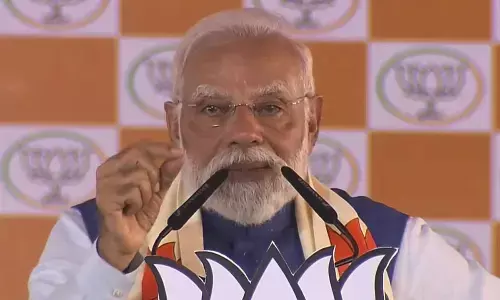Speech is power. Speech is to persuade. Master it!

In 1974, I was a student of VIII Standard. On the occasion of Gandhi Jayanti (October 2) our school organised an elocution competition. As a curious child, I was also keen to participate.
In 1974, I was a student of VIII Standard. On the occasion of Gandhi Jayanti (October 2) our school organised an elocution competition. As a curious child, I was also keen to participate.
My father wrote the speech for me. I had to literally memorise it by heart. I was asked to practice it before my family members, neighbours.
I felt no embarrassment to perform the same speech again and again. But looking back four decades later, I realise that this practice, the no-embarrassment quality, transformed me into a public speaker.
In an advice to enthusiasts, Hillary Clinton said, “If you’re not comfortable with public speaking - and nobody starts out comfortable; you have to learn how to be comfortable - practice. I cannot overstate the importance of practicing.
Get some close friends or family members to help evaluate you critically, or somebody at work that you trust.”
Bad speakers are repetitive in that they have a habit of speaking the same thing, quoting same illustrations or examples in every speech.
In order to be a good and popular speaker, one should study the audience, the ambience where he or she is asked to deliver the speech, the occasion and the context.
I was once asked to be the chief guest at a meeting organised to commemorate World Asthma Day. I am neither a pulmonologist to treat Asthma nor a patient. Yet, I had to speak. I can’t speak superficially.
When I started reading about it something interesting struck my attention. I ‘discovered’ that women who had ‘nagging’ husbands are more prone to this disease. It’s called ‘Battered Women’s’ syndrome.
The reference to this surprised even some of the doctors too. This is the advantage of tailoring public speaking that is relevant to the occasion.
Some speakers exhilarate the audience. But once the speech is over, the audience fails to recollect the essence of the speech. Thus, public speaking should be lively. But, all lively speeches need not be great speeches.
The good public speaker makes it a point to ensure that the audience remembers at least salient aspects of what one has spoken about.
Winston Churchill, known for his fine oratory, once rightly observed “If you have an important point to make, don’t try to be subtle or clever. Use a pile driver. Hit the point once. Then come back and hit it again.
Then hit it a third time — a tremendous whack.” Speakers sometimes bombard us with their uninterrupted speech. Audience is not given time even to breathe. Nobody knows where one starts and where it ends.
Mark Twain, the extraordinary American humourist, has the advice to offer for such bad speakers. “The right word may be effective, but no word was ever as effective as a rightly-timed pause.”
As the proverbial philosopher, Martin Farquhar Tupper felt, “Well-timed silence hath more eloquence than speech.”
However, popular a speech may be, it serves no purpose if it lacks substance. A good public speech is something that has an equal good public purpose. This is precisely the difference between a popular speaker and an inspirational orator.
An inspiring speaker is certainly popular too. But an attractive speaker need not necessarily be an inspiring speaker.
As a measure of cultivating public speaking, American singer/songwriter and producer, Gregg Alexander cautions that there are three things to aim at in public speaking: first, to get into your subject, then to get your subject into yourself, and lastly, to get your subject into the heart of your audience.
Even the Roman conservative historian, Cato the Elder simply advises us to grasp the subject, the words will follow.
Matt Abrahams, the author of ‘Speaking up without Freaking Out’ in an essay on ‘A Big Data Approach to Public
Speaking’ takes us through some of the basic characteristics of communication vital for an effective public speaking.
The actual words you use matter. Word choice should be appropriate for your audience and conform to the context. Relying on jargon is likely to confuse your audience. Avoid hedging language.














